|
Books Should Be Free Loyal Books Free Public Domain Audiobooks & eBook Downloads |
|
|
Books Should Be Free Loyal Books Free Public Domain Audiobooks & eBook Downloads |
|
Science |
|---|
|
Book type:
Sort by:
View by:
|
By: Archibald Williams (1871-1934) | |
|---|---|
 Romance of Modern Engineering
Romance of Modern Engineering
As it would be impossible to treat, in the compass of a few hundred pages, all the great engineering feats of modern times without reducing individual accounts to uninteresting brevity, the author has preferred, where selection is possible, to take typical instances of engineering practice, and, by the aid of comparatively detailed descriptions, to place the reader in a position to appreciate them and similar undertakings. - Summary by Adapted from the Preface | |
 Romance of Modern Invention
Romance of Modern Invention
This is a volume of exploration into the newest inventions of the turn of the previous century. Journalist Archibald Williams walks the reader through diverse inventions which were changing the world at just that point in time. - Summary by Carolin | |
 Romance of Modern Mechanism
Romance of Modern Mechanism
In 1910, when this book was published, the advancement of modern mechanism was still moving at a rapid pace. It must have seemed like very day, new inventions were made to make life easier. Most of these are still very much in use today, such as the lawn-mower, automatic milking machines in the dairy industry, fire engines, and escalators. Learn about how these worked in this volume. - Summary by Carolin | |
By: Aristotle (384 BC - 322 BC) | |
|---|---|
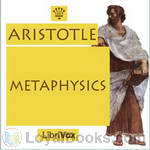 Metaphysics
Metaphysics
Metaphysics is essentially a reconciliation of Plato’s theory of Forms that Aristotle acquired at the Academy in Athens, with the view of the world given by common sense and the observations of the natural sciences. According to Plato, the real nature of things is eternal and unchangeable. However, the world we observe around us is constantly and perpetually changing. Aristotle’s genius was to reconcile these two apparently contradictory views of the world. The result is a synthesis of the naturalism of empirical science, and the mysticism of Plato, that informed the Western intellectual tradition for more than two thousand years... | |
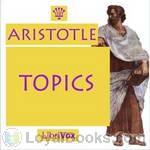 Topics
Topics
The Topics is is the fifth of Aristotle's six texts on logic which are collectively known as the Organon ("Instrument"). The Topics constitutes Aristotle's treatise on the art of dialectic—the invention and discovery of arguments in which the propositions rest upon commonly-held opinions or endoxa. Topoi are "places" from which such arguments can be discovered or invented. In his treatise on the Topics, Aristotle does not explicitly define a topos, though it is "at least primarily a strategy for argument not infrequently justified or explained by a principle." | |
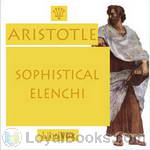 Sophistical Elenchi
Sophistical Elenchi
De Sophisticis Elenchis is the sixth of Aristotle's six texts on logic which are collectively known as the Organon ("Instrument"). In De Sophisticis Elenchis Aristotle identifies 13 falacies. Verbal Fallacies are: Accent or Emphasis; Amphibology; Equivocation; Composition; Division and Figure of Speech. Material Fallacies are: Accident; Affirming the Consequent; Converse Accident; Irrelevant Conclusion; Begging the Question; False Cause and Fallacy of Many Questions. | |
 On the Heavens
On the Heavens
On the Heavens (Greek: Περί ουρανού, Latin: De Caelo or De Caelo et Mundo) is Aristotle's chief cosmological treatise. In it Aristotle argues that the Earth is a sphere by pointing to the evidence of lunar eclipses. Aristotle also provides a detailed explanation of his theory of 'gravity' arguing that things which contain 'earth' fall towards the centre of the Universe because 'earth' is naturally attracted to the centre of the Universe. Aristotle argues that if the planet Earth was moved to the location of the Moon then objects which contain 'earth' would not fall towards the centre of the Earth but rather towards the centre of the Universe... | |
 On Generation and Corruption
On Generation and Corruption
On Generation and Corruption (Ancient Greek: Περὶ γενέσεως καὶ φθορᾶς, Latin: De Generatione et Corruptione, also known as On Coming to Be and Passing Away) is a treatise by Aristotle. Like many of his texts, it is both scientific and philosophic (although not necessarily scientific in the modern sense). The philosophy, though, is essentially empirical; as in all Aristotle's works, the deductions made about the unexperienced and unobservable are based on observations and real experiences... | |
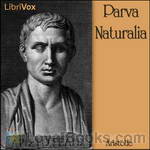 Parva Naturalia
Parva Naturalia
Parva Naturalia [the "short treatises on nature" (a conventional Latin title first used by Giles of Rome)] is a collection of books by Aristotle, which discuss natural phenomena involving the body and the soul. The books are as follows:I - On Sensation and the SensibleII - On Memory and RecollectionIII - On Sleeping and WakingIV - On DreamsV - On Prophecy in SleepVI - On Longevity and Shortness of LifeVII - On Youth and Old Age, Life and Death VIII - On Respiration | |
 Meteorology, On the Universe & On Breath
Meteorology, On the Universe & On Breath
Meteorology by Aristotle Translated by Erwin Wentworth Webster before he fell in action in 1917. Book I: The Celestial Sphere, Stars & Precipitation Book II: Seas, Winds & Earthquakes Book III: Halos, Rainbows & Mock Suns Book IV: The Elements & Secondary Qualities On the Universe is attributed to Aristotle but may have been written by Posidonius the Stoic or someone well acquainted with his work. Two candidates for the Alexander addressed in the text are Alexander the Great and Tiberius Claudius Alexander, nephew of Philo Judaeus and Procurator of Judaea, and in A... | |
 Generation of Animals
Generation of Animals
Generation of Animals ; Latin: De Generatione Animalium) Book 1: Sexual Parts, Semen & Sexual Generation Book 2: Sexes, Embryo Development & Sterility Book 3: Birds, Fish, Cephalopods, Insects, Bees & Testacea Book 4: Causes of Sex, Heredity & Teratology Book 5: Distinction between Necessity and the Final Cause Charles Darwin wrote: "Linnaeus and Cuvier have been my two gods, though in very different ways, but they were mere schoolboys to old Aristotle." - Summary by Geoffrey Edwards | |
 Movement & Progression of Animals
Movement & Progression of Animals
Movement of Animals begins with a discussion of the physics of motion and asks whether God, the Unmoved Mover, exists outside of our Universe. Progression of Animals asks why animals have the parts they do and to what end these parts are possessed. - Summary by Geoffrey Edwards | |
 On the Parts of Animals
On the Parts of Animals
On the Parts of Animals by Aristotle . The first book asks whether animals were designed or came into existence by chance. The remaining three books focus on particular examples of various animals and the functions of their organs. The translator William Ogle, who was both a medical doctor and classicist, presented Charles Darwin with a copy of this translation. | |
 History of Animals
History of Animals
Book I Grouping of animals and the parts of the human body. Book II Different parts of red-blooded animals. Book III Internal organs. Book IV Animals without blood . Books V & VI Animal reproduction. Book VII Human reproduction. Book VIII Habits . Book IX Social behavior. Book X Dealing with barrenness in women was excluded from the translation of D'Arcy Thompson for being spurious so the translation of the Clergyman Richard Cresswell is used instead. Sir D'Arcy Wentworth Thompson was a biologist, mathematician and classicist who also wrote On Growth and Form which discusses the mathematical patterns and structures formed in plants and animals. | |
By: Arnold Bennett (1867-1931) | |
|---|---|
 How to Live on Twenty-Four Hours a Day
How to Live on Twenty-Four Hours a Day
This book is a classic piece on self improvement teaching you to live to the fullest. Judging from the title of the book, the reader might expect that the book is a manual on how to manage your time better. Nothing could be further from the truth, this book is a flowery and witty self help book aimed at helping readers improve the quality of their lives, in fact it is one of the firsts of its kind in the world. Bennett describes the twenty four hours in a day as a miracle and that it should be used for the betterment of health, wealth, respect, pleasure and contentment... | |
By: Arthur Griffiths (1838-1908) | |
|---|---|
 Chronicles of Newgate Vol 1
Chronicles of Newgate Vol 1
Good against evil; right versus wrong; the judicial system against the criminal world. The struggle is as old as mankind. Sometimes the lines are blurred as the 'good' punish the 'bad' - the warriors against crime have resorted not only to killing wrong-doers, but additionally subjecting them to "starvation or the withholding of fluid, by drowning, stoning, impaling or by exposing the wretched victims to the stings of insects or snakes." Newgate Prison was one of the most famous - or infamous - prisons in England from the middle ages until the nineteenth century. Griffiths, a prison administrator, takes us inside where we discover "man's inhumanity to man". | |
By: Arthur Henry Patterson (1857-1935) | |
|---|---|
 Man and Nature on the Broads
Man and Nature on the Broads
From its man-made origins as a consequence of medieval peat excavations, the Broads of Norfolk and Suffolk have evolved into a natural ecosystem, providing habitat for a diverse range of flora and fauna , as well as a means of livelihood for the inhabitants of this region. In the company of the book’s author, a self-taught lifelong naturalist and undisputed expert of the Broads , we discover how the life of the Broads unfolds over the course of a single year. So, why not listen in, and join us... | |
 Notes of An East Coast Naturalist
Notes of An East Coast Naturalist
Arthur Henry Patterson was a self-taught naturalist with an immeasurable knowledge and perspicacity of the Broadland region’s flora and fauna – especially the area around Great Yarmouth and Breydon Water. He was the author of many books about Broadland and was a regular and popular contributor to the local county newspaper. From an early age, he developed an affinity with the natural history of the Broads and kept extensive daily notes on the area’s wildlife – which ultimately led him to collate and distil the observations that he had recorded over 25 years into this book... | |
 Through Broadland in a Breydon Punt
Through Broadland in a Breydon Punt
Arthur Henry Patterson was a self-taught naturalist who, from a very early age, devoted much of his free time to observing, discovering and documenting all aspects of the natural history of the Norfolk Broads, especially the area around Breydon Water near his home town of Great Yarmouth. At some 75000 acres , the Broads are the largest protected wetland in Britain. AHP was the author of many books about Broadland as well as submitting numerous papers and articles to nature societies and journals... | |
 Wild Life on a Norfolk Estuary
Wild Life on a Norfolk Estuary
Published in 1907 by Arthur Henry Patterson, a self-taught local naturalist, Wild Life on a Norfolk Estuary was one of his defining books on the seasonal nature and natural history of the Norfolk Broads. The book is presented in two sections - The first part documents life on and around Breydon Water and the Broads throughout each season of the year, whilst the second part is a continuation of a previous AHP book – Notes of an East Coast Naturalist. AHP’s approachability, enthusiasm and extensive knowledge of the natural history of the Broads region would allow him to develop regular contacts with a wide range of fellow naturalists... | |
By: Arthur T. Pierson (1837-1911) | |
|---|---|
 George Müller of Bristol
George Müller of Bristol
George Muller was a great hero of faith. His greatest aim was to demonstrate that God answers prayer and can be trusted for every minute detail of life. Spending countless hours asking God to provide his needs, he only relied upon God. God called him to care for orphans and he conducted his orphanage in the same way, on faith alone. When a certain need was apparent, they would immediately go to God in prayer. In this dynamic dependance on God, He always proved faithful. He also established over a hundred schools, educating over a hundred thousand people! His example of absolute dependence on God stands in the gap of history to declare that God is enough, and He is faithful! | |
By: Arthur William Clayden (1855-1944) | |
|---|---|
 Cloud Studies
Cloud Studies
Classification of clouds, and meteorological condition of how they are formed. Written by Arthur W. Clayden, M.A., who was the former principal of University College, Exeter, UK - | |
By: Asa Gray (1810-1888) | |
|---|---|
 Natural Science and Religion
Natural Science and Religion
Asa Gray was a highly-regarded botanist at Harvard University and a friend and collaborator of Charles Darwin. As a Christian, Gray was concerned with the disconnect developing through the nineteenth century between the growing understanding of the natural world and the traditional worldview assumed by orthodox Christianity. This book presents two lectures he gave to theology students at Yale College in which he argues that a disconnect is not inevitable, but that a Christian perspective can and should incorporate current understanding of the world provided by natural science. - Summary by BarryGanong | |
By: Auguste Comte (1798-1857) | |
|---|---|
 General View of Positivism
General View of Positivism
Auguste Comte was from France and published this book in French in 1844. He made a very great impact on the sciences and claims to have “discovered the principal laws of Sociology." Comte says Reason has become habituated to revolt but that doesn’t mean it will always retain its revolutionary character. He discusses Science, the trade-unions, Proletariat workers, Communists, Capitalists, Republicans, the role of woman in society, the elevation of Social Feeling over Self-love, and the Catholic Church in this book... | |
By: Austin L. Rand (1905-1982) | |
|---|---|
 Stray Feathers From a Bird Man's Desk
Stray Feathers From a Bird Man's Desk
Canadian zoologist, Austin L. Rand, takes a divergence from his scholarly works on ornithology to give us 60 entertaining sketches of bird life and lore from Birds Bathing to Courtship Feeding. From the author's introduction: "In looking back over the preparation of these sketches I feel as though each evening I'd gathered up the bits and pieces left over from the day's work and fashioned them into designs for my own amusement and the edification of my family. Truly it's as though I'd used stray feathers, fallen from the bird skins I'd handled, and fitted them together into something of wider interest than the original... | |
By: Ayn Rand (1905-1982) | |
|---|---|
 Anthem
Anthem
The title 'Anthem' is derived as an anthem to sense of self and self-governing thoughts. Anthem is a story of Equality 7-2521 who is a young man living in some unspecified future time and place. In this future era freedom and individual rights have been eradicated. The starring character of the novel is an inquisitive street cleaner. He lives in a society where people have lost their knowledge of individualism, to the extreme that people do not know words like 'I' or 'mine'. All the people live and work for their livelihood in collective groups, along with the people with power, namely the 'Councils'... | |
By: B. G. Jefferis and J. L. Nichols | |
|---|---|
 Searchlights on Health
Searchlights on Health
SEARCHLIGHTS ON HEALTH. THE SCIENCE OF EUGENICSBy PROF. B.G. JEFFERIS, M.D., PH. D. KNOWLEDGE IS SAFETY. 1. The old maxim, that Knowledge is power, is a true one, but there is still a greater truth: KNOWLEDGE IS SAFETY. Safety amid physical ills that beset mankind, and safety amid the moral pitfalls that surround so many young people, is the great crying demand of the age. 2. CRITICISM.--This work, though plain and to some extent startling, is chaste, practical and to the point, and will be a boon and a blessing to thousands who consult its pages... | |
By: Ben Bova (1932-) | |
|---|---|
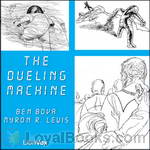 The Dueling Machine
The Dueling Machine
The Dueling Machine is the solution to settling disputes without injury. After you and your opponent select weapons and environments you are injected into an artificial reality where you fight to the virtual death… but no one actually gets hurt. That is, until a warrior from the Kerak Empire figures a way to execute real-world killings from within the machine. Now its inventor Dr. Leoh has to prevent his machine from becoming a tool of conquest. – The Dueling Machine, written with Myron R. Lewis, first appeared in the May, 1963 issue of Analog Science Fact & Fiction. | |
By: Benjamin Griffith Brawley (1882-1939) | |
|---|---|
 Your Negro Neighbor
Your Negro Neighbor
An historical and sociological view of race relations in America as it pertains to the African-American. - Summary by KevinS | |
By: Bernard Le Bovier de Fontenelle (1657-1757) | |
|---|---|
 Conversations on the Plurality of Worlds
Conversations on the Plurality of Worlds
This book is a popular science book written in the late 1600s. It is written as a series of conversations between a gallant philosopher and a countess, while walking in her garden and gazing at the stars. The philosopher explains the heliocentric model of the solar system and also muses on the possibility of extraterrestrial life. While it explains the heliocentric model, unlike other astronomy works of the time, it did not attract the attention of the Church. | |
By: Bernhard Eduard Fernow (1851-1923) | |
|---|---|
 Brief History of Forestry
Brief History of Forestry
An accessible, comprehensive summary of the science and art of forestry, from its ancient roots to its 20th century techniques . This book synthesizes forestry efforts and practices from around the globe, providing the reader with unique lens into the sociocultural, historic and, of course, economic processes of nearly every world region. | |
By: Bertha M. Clark | |
|---|---|
 General Science
General Science
GENERAL SCIENCEBY BERTHA M. CLARK, PH.D.PREFACEThis book is not intended to prepare for college entrance examinations; it will not, in fact, prepare for any of the present-day stock examinations in physics, chemistry, or hygiene, but it should prepare the thoughtful reader to meet wisely and actively some of life's important problems, and should enable him to pass muster on the principles and theories underlying scientific, and therefore economic, management, whether in the shop or in the home. We... | |